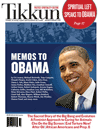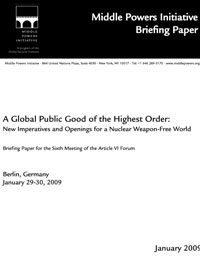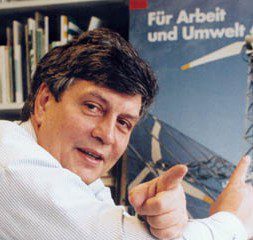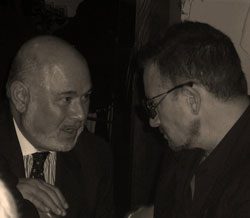Congratulations to new MPI Chairman
Ambassador Henrik Salander
We are honored to welcome Ambassador Henrik Salander as the new Chairman of the Middle Powers Initiative. Ambassador Salander is an accomplished diplomat and an effective disarmament advocate, and will be an extraordinary addition to our team of leaders here at GSI. We look forward to his leadership of MPI. We are pleased to share with you, below, a few words from the Chairman, the first in his new capacity.
In this eAlert:
1. A Message from the President
2. A Message from MPI Chairman Ambassador Henrik Salander
5. PNND Update #22 now available
![]()
A Message from GSI President Jonathan Granoff
We sit before a moment of extraordinary change. Now, more than ever, we must work together to build bridges between peoples and countries, and affect the promise of change that this moment holds. We know all too well how interdependent we are on each other; this historical moment has illuminated for us just how intertwined our economic security is with that of our neighbors’. Our stability depends on our capacity to cooperatively to save our shared economies and our shared planet. Nuclear weapons are walls; we need bridges.
|
|
|
GSI President Jonathan Granoff with
|
Our work, and the work of our allies in governments and in global civil society to keep the focus on abolition and a common security framework is ever more important. Your support of our efforts is much needed.
Our adversaries are actively strategizing on how to perpetuate the nuclear weapons status quo. The new US President will be challenged to obtain incremental progress such as support for the Comprehensive Test Ban Treaty in exchange for new warheads or increased funding for simulated testing. Without coherent, sophisticated and strategic organizing, the goal of the abolition of nuclear weapons could be obscured.
GSI is such a coherent voice for nuclear weapons abolition. As Senator Cranston, GSI’s visionary founder, often said, “Nuclear weapons are unworthy of civilization.” With your help, we can amplify this voice at the highest levels of national governments, in parliaments, at the United Nations and at important civil society fora.
Just recently, our supporters enabled us to undertake the following extraordinary accoplishments:
- We co-sponsored an exceptional conference at the UN with the East West Institute, where the Secretary-General laid out an unprecedentedly ambitious proposal for nuclear abolition;
- The Nobel Laureate Summit— to which I am a Senior Adviser– adopted a strong statement on human rights at the recent meeting in Paris, which includes crisp and focused language on nuclear disarmament.
- We brought high-level diplomats and experts together to discuss strategies for a nuclear weapons convention;
- Our parliamentary program, PNND, joined the Government of Costa Rica in organizing a day-long diplomatic roundtable on a nuclear weapons convention in Geneva;
- the IPU now has significantly strong links with our PNND network; I chaired, for the second year in a row, a plenary session of the Inter-Parliamentary Union summit at the UN;
- We helped to organize the 2008 Comprehensive Test Ban Treaty Ministerial Meeting- a Message of Hope and Peace, with participation of Secretary-General Ban-ki Moon, former Secretary of Defense Bill Perry and UN Messenger of Peace Michael Douglas; also arranged high-level consultation with senior diplomats and the UN Office for Disarmament Affairs;
- Chaired plenary sessions and served as summation speaker at the prestigious Point of Peace Summit in Norway, where speakers included Nobel Peace Laureates Kim Dae-Jung, former President of South Korea; Mairead Corrigan Maguire and Rajendra Pahcauri. (Watch the video that was made here, which we helped craft and provided the introduction for). Other participants include Jan Egeland, former Under-Secretary-General for Humanitarian Affairs; Kjell Magne Bondevik, Former Prime Minister of Norway and others;
- Helped create working groups on nuclear weapons and space weapons within the World Academy of Art and Science, and addressed plenary of World Academy General Assembly in Hyderabad, India;
- Several suggestions that we offered in my intervention in Iran have entered into the substantive negotiations that are taking place internationally now; we have since joined a coalition led by Ambassador Bill Luers, Dr. Trita Parsi, Ambassador Tom Pickering and other luminaries;
- PNND sponsored a seminar in the European Parliament, along with the Nobel Laureate Organization the International Physicians for the Prevention of Nuclear War, on “Rebuilding Trust: US Nuclear Weapons in Europe and the Renewed Arms Race.” We brought a key member of the Russian Duma, MP Sergei Kolesnikov, to speak.
These initiatives and others are reported on in our recent newsletters. Video of the GSI leaders’ presentations at the YaleDivinitySchool, in New Delhi and elsewhere is available here.
The Global Security Institute is making a critical difference, and we need your help. As our political accomplishes mount, our responsibility grows. Your support will ensure that we can continue these important activities in 2009 and beyond. Please consider making a donation to GSI today by donating safely and securely here on our website.
From all of us at the Global Security Institute, I wish you all a happy, safe and peaceful new year.
Best,
Jonathan Granoff
President
![]()
A Message from MPI Chairman Ambassador Henrik Salander
 |
Dear friends,
A few days ago I took office as chairman of the Middle Powers Initiative. I have the honour of succeeding the incomparable Senator Douglas Roche of Canada, the founder and ten-year leader of the MPI, who will now become Chairman Emeritus of our organisation.
I am grateful for the confidence that the International Steering Committee of the MPI has put in me. I must say that I feel uncertain whether I will be up to the task, but in any case I will do my best to carry Senator Roche’s work forward and to continue the development of MPI’s role as an effective promoter of universal nuclear disarmament.
We may have a window of opportunity in front of us. After several years of adverse developments, the vision of a world free of nuclear weapons has recently gained momentum. The MPI should seize this opportunity and intensify its efforts as a supporter to, and vehicle of, non-nuclear-weapon states.
Without Douglas Roche there would have been no Middle Powers Initiative. This brilliant political concept and strategic tool could only have been created by the unique combination of knowledge, enlightenment and ingenuity that is characteristic of Douglas Roche.
I can honestly say that Senator Roche has been a guiding light for me ever since I took my first steps on disarmament ground. He has inspired by example. He has shown the world that even if one represents lesser powers than those of the nuclear weapon states, one can influence and re-direct developments if one has a strong will, passionate dedication and sharp analysis. The recent re-entry of nuclear disarmament into the imagination of people worldwide has without a doubt happened partly because of Senator Roche’s decades-long efforts.
We live in troubled but exciting times. The new US administration has the opportunity, and may have the will, to change the parameters of the international discussion about nuclear weapons. In dialogue with recent new leadership in other nuclear weapon states, the US can take a leading role in the march-up to the NPT Review Conference in 2010. The MPI should encourage the nuclear-weapon states and assist them in making that conference a turning-point.
The next exchange of views between middle powers representatives will take place at the end of this month, in Berlin, where the MPI and the German government are convening an Article VI Forum. The timing of this session could not be better when it comes to discussions on how to bring about the necessary strengthening of the nuclear non-proliferation and disarmament regime and on the role of middle powers’ governments, parlamentarians and civil society in this.
The road to a world free of nuclear weapons will not be easy, and it will not be fast. But we have started that road and taken the first steps. The time is approaching when MPI and other forces of change can make a real difference together. I am very much looking forward to many years of working with you all towards reaching our goal of worldwide nuclear disarmament.

Ambassador Henrik Salander
Chairman, Middle Powers Initiative
![]()
 |
The following article was printed in Tikkun magazine, a bimonthly interfaith critique of politics, culture, and society.
A two-class world, with nuclear weapon “haves” and “have nots,” is incompatible with the cooperation needed to effectively protect the global commons, address crushing poverty, and ensure sustainable development.
We all depend upon the same climate, oceans, and rainforests for sustenance. To protect these living systems, as well as address systemic poverty, legally verifiable and enforceable cooperative regimes are necessary. If one country can dump toxins in the ocean, all can register ships under that country’s jurisdiction and similarly pollute. If one country has nuclear weapons, others will want and eventually get them. Global norms must be established to effectively address global challenges.
Bridges of cooperation are needed more than ever, and nuclear weapons build walls. To expect countries to forsake short-term economic opportunities for long-term environmental responsibility while being second-class security citizens is unrealistic.
Visit the Tikkun website to read the rest of the article.
![]()
A Global Public Good of the Highest Order
 |
On January 5, the Middle Powers Initiative (MPI) released “A Global Public Good of the Highest Order,” a briefing paper prepared for the sixth meeting of the Article VI Forum, to be held in Berlin, January 29-30, 2009. The following excerpt provides a summary of the paper.
» Click here to download the briefing paper
Summary
“A world free of nuclear weapons would be a global public good of the highest order,” declared UN Secretary-General Ban Ki-moon on October 24, 2008. The outlook for movement toward achievement of such a world is improving dramatically, not least due to the January 2009 installation of a new US administration.
The Berlin Article VI Forum convened by the Middle Powers Initiative (MPI) will examine current imperatives and openings, outlined in this Briefing Paper, for going beyond proposals to action. The imperatives are:
– the deteriorating relationship between Russia and the United States/NATO
– the destabilizing effect of new anti-missile systems and the ongoing reliance on nuclear forces
– the disruptive effect of the stalemated dispute over Iran’s nuclear program
– the Nuclear Suppliers Group’s exemption for India
– the prospect of increased worldwide reliance on nuclear power
– the potentially adverse effects of the global financial crisis on international order
The openings include:
– the Secretary-General’s call for fulfillment of the nuclear Non-Proliferation Treaty’s (NPT) Article VI through negotiation of a nuclear disarmament framework or convention; engagement of the Security Council; action on legal instruments now on the agenda; increased transparency and accountability; and convening of a disarmament summit
– US President-elect Obama’s intent to demonstrate compliance with the NPT disarmament obligation; to pursue verified US-Russian reductions, ratification of the Comprehensive Nuclear-Test-Ban Treaty (CTBT), negotiation of a verified Fissile Material Cut-off Treaty (FMCT), and increasing warning and decision time prior to launch of nuclear weapons; and to initiate high-level dialogue among nuclear weapon states on how to move toward eventual elimination of all nuclear weapons.
A number of measures prioritized by MPI now appear ripe for action. Several will be examined at the Berlin meeting – verified reductions, the FMCT, and the CTBT. They are discussed in this Briefing Paper, along with another topic of the meeting – ways to advance a nuclear weapons convention.
» Click here to download the briefing paper
![]()
 |
|
PNND member Herman Scheer MdB, driving force behind the International Renewable Energy Agency |
The 22nd edition of PNND Update, the periodic newsletter from Parliamentarians for Nuclear Non-proliferation and Disarmament, is now available online in English and in French. PNND Update includes information on disarmament initiatives geared especially for parliamentarians and their staff.
» Peruse old archived editions of PNND Update
» Download PNND Notes, the annual hardcopy publication for the PNND network (also available in German, French and Spanish).








